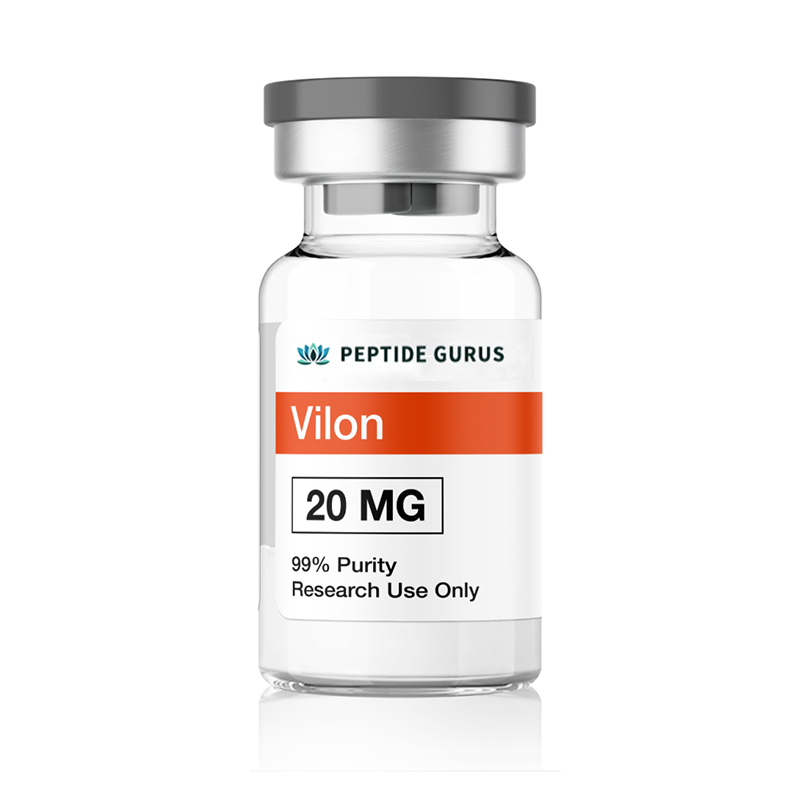



Categories: Peptide Bioregulators, Peptide Finished product, Peptides and Their Dosages
Free (1) 30 ml Bacteriostatic Water
with qualified orders over $500 USD.
(excludes capsule products, cosmetic peptides, promo codes and shipping)
Vilon is a potent immunomodulator and anti-aging bioregulator peptide with ample research to back its benefits. There are also high levels of evidence that Vilon may help prevent/reduce the risk of cancer development and progression. Interestingly, research has shown that Vilon appears to provide better anti-aging effects when administered early in life and at consistent, low doses. These findings may help open the door to better anti-aging research and help scientists to better understand how epigenetic regulation plays an important role in longevity.
Product Usage: This PRODUCT IS INTENDED AS A RESEARCH CHEMICAL ONLY. This designation allows the use of research chemicals strictly for in vitro testing and laboratory experimentation only. All product information available on this website is for educational purposes only. Bodily introduction of any kind into humans or animals is strictly forbidden by law. This product should only be handled by licensed, qualified professionals. This product is not a drug, food, or cosmetic and may not be misbranded, misused or mislabled as a drug, food or cosmetic.
At just two amino acids in length, Vilon is the shortest peptide known to have biological activity. Research shows that Vilon has potent anti-aging effects and that it is a powerful regulator of immune function. There is also good evidence that Vilon helps to regulate the vascular system and promotes hemostasis. Vilon has been shown to reduce the incidence and growth of spontaneous tumors, though its role as an adjuvant in cancer treatment (as opposed to prevention) has been called into question. Overall, Vilon has several staunch advocates, such as Dr. Vladimir Anisimov, who feel that the peptide is a useful geroprotective agent.
Research out of Russia indicates that Vilon is a potent regulator of chromatin structure. One study found that Vilon:
• induces unrolling of chromatin,
• activates synthetic processes via reactivation of ribosomal genes in the unrolled chromatin,
• releases repressed genes, and
• does not cause decondensation of pericentromeric structural chromatin[1].nduces unrolling of chromatin,
The net result of the changes that Vilon causes to DNA is reactivation of genes that are otherwise silenced. In general, chromatin is found in either the wound (heterochromatin) or unwound (euchromatin) states. Heterochromatin cannot be accessed by the apparatus that turns genes into proteins and thus functional components of the cell. Genes in these regions of DNA are simply unavailable for protein production.
In general, chromatin helps to regulate which genes are available for transcription and is thus one way that different-cells can have different functions or that the same cells can have different functions over time. Unfortunately, chromatin condensation is also something that occurs as a result of aging and senescence and is at least one reason why our cells and tissues lose function as we get older.
Similar to its activity in lymphocytes, Vilon has been shown to activate interluekin-2 signaling in cells of the spleen[3]. Interleukin-2 is important in coordinating the immune response to microbial infection and helps to prevent autoimmune reactions. By activating lymphocytes and splenocytes while boosting natural protection against autoimmune reactions, Vilon restores the immune system to a more active state and may even be useful in developing treatments for autoimmune diseases.
Adding to its ability to prevent autoimmune reactions is the role of Vilon in the thymus. Research in thymus cultures shows that Vilon increases the proliferation of CD5 T-cells. CD5 is a marker of mature T-helper cells as well as cytotoxic CD8 T-cells. The former helps to regulate the immune system and prevent autoimmune reactions, while the latter is one of the most potent anti-microbial cells in the body[4].
Interestingly, Vilon appears to only reactivate immune functions via genes that have been silenced by changes in chromatin. It does not appear to activate genes that would naturally be silent in the cells it affects. In other words, Vilon does not turn lymphocytes into neurons by activating genes that would normally not be active in healthy lymphocytes. Instead, the peptide appears to boost activity in the immune system while simultaneously helping to prevent autoimmune reactions.
As pointed out above, Vilon helps to reduce the incidence of cancer in mouse models, which is at least one way in which it prolongs average lifespan. Additional research shows that Vilon not only prevents tumors from forming, but inhibits their growth after they are present[5]. This suggests that Vilon may be both an effective chemotherapeutic in its own right, as well as a potential additive to existing cancer treatments. In the future, Vilon may be a standard addition to everything from chemotherapy to radiation treatment and surgery.
At least one study, out of Russia, contradicts the claim that Vilon may be a useful adjuvant to chemotherapy. The works shows that the combination of Vilon and platinum-based chemotherapeutic agents is problematic rather than synergistic[6]. Unfortunately, this study used only one specific type of chemotherapy and was limited in scope, so the results cannot be generalized. It remains to be seen if Vilon is only effective against cancer on its own or if the peptide can be added to other treatment regimens to boost results.
Research in mice shows that subcutaneous administration of Vilon increases physical activity and endurance while helping to reduce the risk of cancer. These two effects resulted in longer lifespan in the treated mice, suggesting that Vilon may be a legitimate anti-aging peptide[7]. This is especially encouraging given that it produced no adverse effects in the mice following long-term administration.
Interestingly, the research shows that the earlier Vilon is administered, the greater its effects seem to be. In other words, giving Vilon to young mice enhances lifespan more than if Vilon is not administered until the mice are much older. This same effect was seen in early studies looking at crude thymic and pineal extracts given to mice to slow down aging[8]. The speculation is that Vilon and similar peptides, when administered late in life, can reverse senescence in existing cells but can obviously do nothing for cells that have already been eliminated through apoptosis. By administering Vilon 20mg early in life, cells get the greatest amount of protection and so turnover is slowed down. The result is that more cells stay healthy for longer periods of time, slowing the need to replace them and preserving limited stem cell lines.
Vilon’s anti-aging effects seem to extend to GI function as well, where the peptide has been shown to improve the activity of certain enzymes in the Gi tracts of older mice. The peptide also appears to improve barrier function, thus reducing the incidence of leaky gut, enhancing disease resistance, and improving the overall health of the GI tract in older mice[9]. Research shows that Vilon thereby helps to improve glucose and glycine absorption in the small intestine of older rats[10]. These features of Vilon may help to maintain nutrient extraction with age, thereby improving overall well-being and perhaps enhancing longevity.
Dr. Vladimir N. Anisimov, who has been researching aging and cancer development since the 1970s, points out that the thymus is one of two glands (the other being the pineal gland) that plays an important role in regulating aging. The healthier the thymus is, the healthier we are as individuals. Of course, Vilon is a thymic peptide and affects cells, like lymphocytes, that are produced in and mature in the thymus. Dr. Anisimov is a staunch advocate for using peptide bioregulators in the prevention of cancer[11]. He is a close colleague of Dr. Vladimir Khavinson.
The effect of Vilon on the vasculature has been less well studied, but there is some work to suggest that it may have a beneficial effect. Research in mice shows that Vilon changes the expression of more than 36 different genes within the heart. When combined with Epithalon, this number jumps to 144 genes[12]. These findings suggest that, at the very least, Vilon has the ability to alter gene expression patterns in the cardiovascular system, a fact that may improve hemodynamic function.
In fact, research in kidneys, highly vascular organs, shows that Vilon decreases concentrations of transforming growth factor-beta(1) and thus the permeability of microvessels. The net result is improved hemostasis during kidney failure, suggesting that Vilon does, in fact, have a beneficial effect on the vascular system[13].
Furthermore, research in elderly patients with diabetes shows that Vilon can help to optimize coagulation by increasing levels of the natural anticoagulants antithrombin III and protein C while also stimulating fibrinolysis[14]. The result is fewer blood clots in a population prone to clotting and the serious consequences that follow. This further supports the idea that Vilon plays an important role in regulating the vascular system.
Vilon is a potent immunomodulator and anti-aging peptide with ample research to back its benefit. There are also high levels of evidence that Vilon reduces the risk of cancer development and progression. Interestingly, Vilon appears to provide better anti-aging and anti-cancer effects when administered early in life and at chronic, low doses. These features may help open the door to better anti-aging research and help scientists to better understand how epigenetic regulation plays an important role in longevity.
Vilon exhibits minimal side effects, low oral and excellent subcutaneous bioavailability in mice. Per kg dosage in mice does not scale to humans. Vilon for sale at
The above literature was researched, edited and organized by Dr. E. Logan, M.D. Dr. E. Logan holds a doctorate degree from Case Western Reserve University School of Medicine and a B.S. in molecular biology.

Prof. Vladimir Khavinson is being referenced as one of the leading scientists involved in the research and development of Livagen. In no way is this doctor/scientist endorsing or advocating the purchase, sale, or use of this product for any reason. There is no affiliation or relationship, implied or otherwise, between
ALL ARTICLES AND PRODUCT INFORMATION PROVIDED ON THIS WEBSITE ARE FOR INFORMATIONAL AND EDUCATIONAL PURPOSES ONLY.
The products offered on this website are furnished for in-vitro studies only. In-vitro studies (Latin: in glass) are performed outside of the body. These products are not medicines or drugs and have not been approved by the FDA to prevent, treat or cure any medical condition, ailment or disease. Bodily introduction of any kind into humans or animals is strictly forbidden by law.
PeptideGurus is a leading supplier of American-made research peptides, offering top-quality products at competitive prices. With a focus on excellence and customer service, they ensure a secure and convenient ordering process with global shipping.
CONTACT